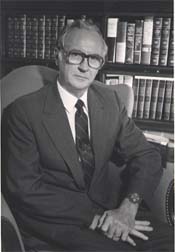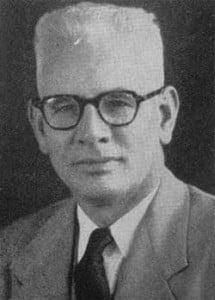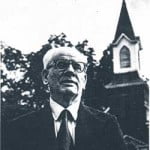Christian Education in its Principles
John Newton Waddell was born on April 2, 1812 in Willington, South Carolina to the Rev. Moses Waddell and his wife Eliza Woodson Pleasant Waddell. He received his education at the University of Georgia, attending there from 1826-1829 and graduating with the Bachelor of Arts degree. He taught at an Academy in Willington, SC from 1830-1832 and was principal of a grammar school in Athens, Georgia from 1833-1834. For a time he turned his hand to farming in South Carolina, Alabama and Mississippi, 1835-1841, before answering a call to the ministry.
He was licensed to preach by Mississippi Presbytery on 15 September 1841 and then served as stated supply for the Mt. Hermon Presbyterian Church of Smith County, Mississippi in 1842. He was then ordained to the pastorate by Tombeckbee Presbytery on 23 October 1843, initially serving as stated supply for the Montrose and Mt. Moriah churches of Newton County, MS, while also serving as a teacher at the Montrose Academy from 1841-1848.
Rev. Waddell next served as stated supply for the Presbyterian church in Oxford, MS and concurrently as a professor of ancient languages at the University of Mississippi, from 1849-1857, having formerly served on the school’s Board of Trustees prior to his appointment. From 1857-1861, Waddell was a professor at the Synodical College in LaGrange, Tennessee. He then worked as an agent for the Bible Society attached to the Confederate States Army, from 7 February to 7 May, 1863 and as Commissioner to the Army of Mississippi (CSA), from 1863 until the close of the war in 1865.
After the war, Rev. Waddell was Chancellor of the University of Mississippi, from 1865 to 1874, and during these years he occasionally served as stated supply for the Oxford and Hopewell churches. Leaving the University of Mississippi, Rev. Waddell was Executive Secretary for the Georgia Commission on Education, from 1874-1879. He somehow also managed to serve as stated supply for the Lauderdale St. church in Memphis during these same years.
From 1879 to 1888, Waddell was Chancellor of the Southwest Presbyterian University, located in Clarksville, Tennessee. He is credited with calling Dr. Joseph Ruggles Wilson, the father of President Woodrow Wilson, to teach at Clarksville. Illness forced his retirement in 1888, though he apparently remained in the Clarksville area until 1891, and he then resided in Avondale (Birmingham), Alabama from 1891 to 1895. Rev. Waddell died in 1895, and is buried in the Greenwood Cemetery in Clarksville, Tennessee.
Honors conferred upon Rev. Waddell included the Doctor of Divinity degree, awarded by the University of Nashville in 1850 and the Doctor of Laws degree (LL.D.), awarded by the University of Georgia in 1873. Rev. Waddell is noted as having called to order the first General Assembly of the Presbyterian Church, U.S. He also served as Moderator of the PCUS General Assembly in 1868 and as stated clerk for General Assembly from 1861-1865.
Prior to the War and before the Old School Presbyterian Church was divided North and South, Rev. Waddell brought a sermon before the General Assembly of the Presbyterian Church (Old School), as it met in New Orleans on May 12, 1858. His message was brought on behalf of the Presbyterian Board of Education, and was titled Christian Education in its Principles:—
Christian Education in its Principles
“19 Go ye therefore, and teach all nations, baptizing them in the name of the Father, and of the Son, and of the Holy Ghost:
20 Teaching them to observe all things whatsoever I have commanded you: and, lo, I am with you always, even unto the end of the world.”—Matthew 28:19-20.
These are the words of the Great Teacher. They were uttered by him who was truly styled by Nicodemus, “a teacher come from God.” Concerning him also, it was the involuntary testimony of emissaries sent by his enemies to apprehend him, “never man spake like this man.” Accordingly, a serious study of the whole life of our incarnate Lord will inevitably lead to the conclusion that he came into the world to teach. To this end we find him, at the age of twelve years, in the temple, sitting among the doctors, “both hearing them and asking them questions,” thus preparing himself to become a teacher of others, and styling this, the being “about his Father’s business.” The prophets, in whose sublime writings Christ is the prominent subject, speak of him as the Counsellor, from whom God’s word and wisdom were to proceed in the form of instructions coming with authority divine. That phrase proper for human prophets commissioned of God, as a preface to their deliverances, “Thus, saith the Lord,” was to be substituted in the precepts of Christ by the emphatic declaration, “Verily, verily, I say unto you.” And his history is the record of the great system which he came to establish.
Whether, therefore, by his preaching in the synagogues, when all “wondered at the gracious words which proceeded out of his mouth;” or, on the Mount, when he opened his mouth and taught the multitude by rectifying the false interpretations and glosses of the Jewish teachers, and presenting the true theory of his own moral code; or, to other multitudes that thronged and pressed upon him in his journeyings, by parables of inimitable beauty and appositeness; or at the well-side, in Sychar, where he sat wearied, and revealed to the sinful Samaritan, not only her sins, but the way of life and salvation; or, in the retired circle of his own immediate family, when he expounded to them more clearly the things of the kingdom; or by the refutation of cavils proposed by the designing enemies who constantly beset his path; or by the amazing wisdom which confounded those who sought to entrap him by questions into an expression of blasphemy or of disloyalty; or by miracles which, while they manifested forth his glory, and proved his divinity also in their character as redemptive acts, forcibly adumbrated some great doctrine of his Gospel; or when tempted in the wilderness; or when turning his cheek to the smiter, and giving his back to the scourge; or when going like sheep before his shearers, dumb to the slaughter, and instead of blasting with a bolt of holy indignation the murderous rabble on Calvary, praying for his enemies, and meekly bowing his head and giving up the ghost: we may not fail to gather from this view of the life-work and dying agony of Jesus, our master, that he was a teacher.
True to this great office, he is to be found, during his life, gathering around him multitudes whom he taught, as a vast school, these great truths which entered into the soul, and shed there a light, scattering the natural darkness of the mind, and the clouds of still more palpable gloom engendered by the false teachings of which they were the victims. A clear inspection of his system will present him narrowing his instructions within a circle of seventy, whom he qualified and sent forth to be themselves teachers of the erring and the ignorant. And yet again, we find him selecting from the number of his followers, twelve, as the favored recipients of the great truths of his Gospel, and daily for three years keeping them in constant attendance upon himself as the members of his own family, and then commissioning them as his representatives to teach all nations. And once more we may detect a still more minute subdivision of this class of twelve, in the favorite three, Peter, James, and John, to whom he imparted lessons, and whom he admitted to privileges of intimacy granted to none others, on the consecrated summit of Tabor, and in the memorable garden of Gethsemane.
To have recorded the lessons of wisdom that fell from his lips, or were imparted by his acts, is an acknowledged impossibility; the world itself would not have contained the books that should have been written to set them forth. We only catch glimpses as it were of the Sun of righteousness as it beamed upon the darkness that covered the earth, sufficient to assure us of the exhaustless nature of the Fountain of light. Confirmatory of this truth is the office assigned him in all scriptural systems of theology, as the prophet of his Church. Let it be observed that while the word of God is clear in setting forth that Christ is a priest and a king as well as a prophet, yet it is a very easily demonstrable fact, that these offices are both inseparably interwoven with, and indebted for their vital efficiency to his prophetic office.
For while the priestly office of Christ in its execution is the divinely appointed method of accomplishing the only plan of salvation, it is undeniable, not only that the knowledge of God, the knowledge of Christ, the knowledge of ourselves, the great truths of the scheme of redemption, must be taught before we can receive Christ as a priest; but also, that the very sacrifice itself, is the most impressive form in which these truths can be taught. For it is beyond all doubt, that when the Son of God was crucified, and offered as a sacrifice for his ransomed Church, he was filling the office of teacher of the great doctrine of the atonement, not only no less than by actual precept, but with far more impressive and irresistible energy and power. By the teaching office men are enlightened in the knowledge of those truths embodied in the sacrifice he offered as the great high priest of our profession.
Again, as to his kingly office in its dependencies upon his prophetic office, as the Church of Jesus Christ is the only visible representation of his kingdom, and as this kingdom is spiritual, and includes the solemn ordinances, the holy oracles, and the heaven-appointed ministry, you perceive from the very constitution of this kingdom, that the prophetic or teaching office is of primary importance, and absolutely essential to its establishment and prosperity. For, while he reigns as king in Zion, it is obvious that his ordinances symbolize, his oracles confirm, and his ministers expound and vindicate those truths, which are at once the law of his kingdom, the instruments of its conquests, and the bulwarks of its defence.
In his own declaration to Pilate, in reply to the question, “Art thou a king?” while he acknowledges that he claims this office—“thou sayest I am a king”—he also bears his own testimony to the teaching character of his kingly office : “To this end was I born, and for this cause came I into the world, that I should bear witness to the truth.” Thus declaring that as a king he reigns over men by enlightening and efficiently controlling their hearts and affections by the influence of the truth, applied spiritually and not by force. By his teaching office it is then that Christ, as King in Zion, first subdues us to himself, then reigns in and defends and crowns the work by conquering all his and our enemies. It is then a truth, of which we must not lose sight, that Christ Jesus the Lord was the model teacher. His teaching office he makes prominent in all he ever said to men on earth. It stands forever pre-eminent among the offices he fills in his Church. He taught in the temple, by the wayside, in cities and in villages. His example taught when in the wilderness with the tempter, and on the cross with his murderers. He was teaching as he sat at meat; he was teaching as he journeyed on the highway. He taught by parable, he taught by miracle. He taught when in the Mount of Transfiguration. He taught in the Garden of his agony. He taught on bloody Calvary. In life and in death he was the great teacher, and thus indicates to the Church he bought with his blood, and established as his kingdom on earth, that the teaching office was the peculiar distinctive function she, the Church, was designed to fulfill.
To read the rest of Rev. Waddell’s sermon delivered before the General Assembly, click here.



